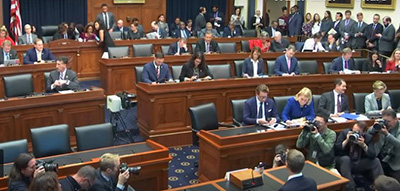
MBA Letters Urge House, Senate Support for FY23 T-HUD Appropriations

The Mortgage Bankers Association, in letters last week to leaders of the Senate and House Appropriations Committees, urged support for the Transportation, Housing and Urban Development (THUD) appropriations bill for Fiscal Year 2023.
The letters voice MBA support on several industry-related priorities within in the bill, including providing FHA with the resources it requires, both in staffing and systems upgrades, to maintain its countercyclical role as a government-backed mortgage insurer.
The letters touch on several familiar themes and recurring appropriations. A brief summary is provided below:
–MBA continues to support providing the Federal Housing Administration with the resources it requires, both in staffing and systems upgrades, to maintain its countercyclical role as a government-backed mortgage insurer. MBA urged the committees to provide $165 million for FHA’s administrative contract expenses, as requested by HUD within President Biden’s FY 2023 budget.
–MBA encouraged the committees to direct HUD to conduct a review of FHA single-family mortgage insurance policies, practices and products to identify barriers or impediments to facilitating mortgage insurance for small dollar mortgages. “Requiring the department to examine how it can streamline its regulations to make the small dollar mortgage market more efficient and accessible is a key step forward for potential home buyers,” MBA said.
–MBA has long-supported resources provided in recent years to HUD’s Cybersecurity and Information Technology Fund to help the agency better meet its acute information technology needs on a broad basis, including multi-family housing IT modernization. MBA also supports the specified $25 million from that Fund for the ongoing upgrade of FHA’s decades-old single-family IT infrastructure, including allocating direct funding to fully support the multi-year FHA Catalyst’s project needs in 2023.
“MBA believes FHA Catalyst is a crucial project intended to modernize FHA’s IT infrastructure and to provide cloud-based platforms to reduce costs, risk and fraud, and bring FHA in line with current industry practices,” MBA said. “We thank the committee for its repeated efforts in this regard. To date, Project Catalyst has made significant improvements to FHA’s technology infrastructure, and it is vitally important to fund these systems upgrades to completion. The directed funds represent a crucial step forward in this multi-year effort to help FHA improve its quality assurance controls and the integrity of its systems.”
–For FHA’s multi-family and healthcare finance programs, MBA urged the committees to include $35 billion in commitment authority for the General Insurance and Special Risk Insurance Fund, as the administration requested in its FY 2023 proposal, as well as funding for rental assistance, particularly Section 8 Project-Based Rental Assistance, that is adequate to meet the needs of HUD’s rental assistance programs. Together, these programs permit private sector lenders to continue to finance workforce and affordable apartments and residential healthcare facilities that serve millions of Americans.
–MBA Also asked the committees to provide HUD with the funding and encouragement necessary to address extended processing delays now experienced by developers in the pipeline for FHA multi-family and healthcare financing. MBA noted delays to produce this sorely needed affordable rental and healthcare financing can be up to six months simply to assign an underwriter to begin processing loan applications.
–For Ginnie Mae, MBA continues to support an increased level of funding for staffing, training and technology needs. “Given Ginnie Mae’s critical role in providing liquidity targeted to low- and moderate-income families, first-time homebuyers, renters, veterans and rural households, increased funding is necessary to prudently manage the increased loan volume in the single-family and multi-family mortgage markets,” MBA said.
Additionally, noting market share for FHA, the Veterans Affairs Home Loan Program and Rural Housing Service single-family lending has continued to shift towards a more diversified base of smaller lenders, MBA asked the committees to provide funding that will allow Ginnie Mae to accommodate and manage the expanded issuer base.
–Congress previously established a statutory prohibition on use of Ginnie Mae securitizations in HUD’s risk sharing programs, also known as Section 542 (b) and (c), by the state Housing Finance Agencies (HFAs). MBA strongly supports retaining this safeguard—in light of the Biden administration’s budget request anticipating legislation to remove that prohibition. MBA recommends Congress maintain the Ginnie Mae prohibition, “which would support a level playing field for private sector FHA-approved multi-family lenders relative to HFAs.”
–MBA supports the FY 2023 request maintaining a prohibition on federal funds to facilitate eminent domain seizures of performing mortgage loans. “By enacting this prohibition for the past several fiscal years, Congress has been able to effectively defuse this threat,” MBA said.
–MBA also supports continued $65.9 million funding for housing and homeownership counseling. “These funds are critical to assisting homeowners facing foreclosure, helping first-time homebuyers navigate the challenges of the purchase process, and counseling for reverse mortgages (a program requirement) for seniors, a traditionally high-risk group targeted for financial fraud,” MBA said.
